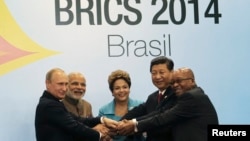Leaders of the BRICS emerging market nations launched a $100 billion development bank and a currency reserve pool Tuesday.
The bank, aimed at funding infrastructure projects in developing nations, will be based in Shanghai. India will preside over its operations for the first five years, followed by Brazil and then Russia, leaders of the five-nation group announced at a summit.
The BRICS – Brazil, Russia, India, China and South Africa – also set up a $100 billion currency reserves pool to help countries forestall short-term liquidity pressures.
The long-awaited bank is the first major achievement of the BRICS countries since they got together in 2009 to press for a bigger say in the global financial order created by Western powers after World War II.
The BRICS sought coordinated action following an exodus of capital from emerging markets last year, triggered by the scaling back of U.S. monetary stimulus.
Growing heft
The new bank reflects the growing influence of the BRICS, which account for almost half the world's population and about a fifth of global economic output.
The bank will start with a subscribed capital of $50 billion, divided equally among its five founders, with an initial total of $10 billion in cash put in over seven years and $40 billion in guarantees.
The bank will start lending in 2016. It will open membership to other countries, but the BRICS’ capital share cannot drop below 55 percent.
The contingency currency pool will be held in the reserves of each BRICS country and can be shifted to another member to cushion balance of payments difficulties. This initiative gathered momentum after the reverse in the flows of cheap dollars that fueled a boom in emerging markets for a decade.
“It will help contain the volatility faced by diverse economies as a result of the tapering of the United States' policy of monetary expansion,” Brazilian President Dilma Rousseff said.
China, holder of the world's largest foreign exchange reserves, will contribute $41 billion, the bulk of the contingency currency pool. Brazil, India and Russia will chip in $18 billion each and South Africa $5 billion.
If necessary, China can ask for half of its contribution, South Africa for double and the remaining countries the amount they put in.
Labored negotiations
Negotiations over the headquarters and first presidency had stalled because of differences between India and China. The impasse reflected the difficulties that Brazil, Russia, India, China and South Africa face in working together to build an alternative to the Bretton Woods institutions dominated by the International Monetary Fund and the World Bank.
“We pulled it off 10 minutes before the end of the game. We reached a balanced package that is satisfactory to all,” a Brazilian diplomat told Reuters.
Negotiations to create the bank dragged on for more than two years as Brazil and India fought China's attempts to get a bigger share in the lender than the others.
A stand against global politics
Earlier in the day, Russia's foreign minister, Sergei Lavrov, said that the BRICS bloc stands against one-sided economic and political measures, but that the emerging nations are not seeking confrontation with the West.
“The summit has confirmed that by speaking against one-sided steps in global politics and economy, BRICS members are not seeking confrontation, but are offering to work out collective approaches to resolve all [global] issues,” Lavrov told reporters at the summit.
The United States has imposed sanctions against Russia, including asset freezes and visa bans against officials and business associates thought to be close to President Vladimir Putin in response to Crimea's annexation. The summit was largely seen as an opportunity for Putin to boost his geopolitical sway amid isolation from the West over the crisis in Ukraine.











